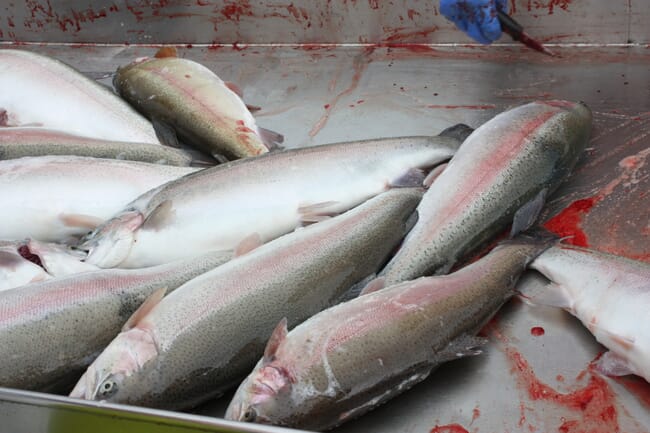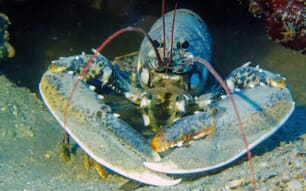The Humane Slaughter Association has awarded £1.93 million for R&D projects, in what marks its largest ever programme of research in an attempt to find more humane ways of slaughtering these animals in future.

The funding, made possible by a generous donation, has been awarded to three separate consortia, which will each be focusing on a specific area – humane stunning of selected farmed finfish, led by Ace Aquatec; stunning and killing commercial species of crabs and lobsters, led by Nofima; and humane slaughter of cephalopods led by the Association for Cephalopod Research, CephRes).
The three projects will develop, test and validate methods which could be used to humanely stun their target species on an industrial scale. They will also assess the commercial viability of the proposed methods and their effects on the quality of the flesh of the slaughtered species, with the aim of developing methods that could be commercially adopted.
The award comes as concern for the welfare of these animals has grown. Worldwide, thousands of millions of farmed fish, farmed or wild-caught crustaceans (eg crabs and lobsters) and cephalopods (eg octopus, cuttlefish and squid), are slaughtered for food every year, many of them by methods that may not be humane.
There is good evidence that finfish may be able to experience fear and pain and the most common methods of slaughter are likely to expose them to substantial suffering over a prolonged period of time. Many species of farmed fish are typically killed by being taken out of water and left to asphyxiate in air, or fish might be chilled on ice slurry or gutted whilst conscious. Many crustaceans and cephalopods are slaughtered for food without stunning and there is a lack of practical and scientifically-validated humane stunning methods for these species.
Nathan Pyne-Carter, managing director of Ace Aquatec said: “Our project is a collaboration with Silsoe Livestock Systems Ltd, Steve Wotton Ltd and the Universities of Bristol and Stirling and IRTA (Institute of Agrifood Research and Technology, Catalonia). The three-year project will implement in-water electrical stunning in large volume finfish aquaculture industries where current killing methods fail to protect fish welfare.” The project will focus on inducing immediate unconsciousness in Nile tilapia, Pangasius, gilthead sea bream, yellowtail and possibly carp, and will attempt to non-invasively record fish brain activity in response to stunning (science is currently lacking such welfare data for some of these species). The project will also consider the potential of a novel type of electrical stunning, SPUC (single pulse ultra-high current), for further improving fish welfare at slaughter.
Dr Bjørn Roth, senior scientist at Nofima, said: “Our project aims to develop and validate equipment designed for electrical stunning and killing all commercial important species of crabs and lobsters in the northern Atlantic. Focus will be on the assessment of the welfare impact of the stunning method using electrical impedance, physiological, behavioural and neurological measures to evaluate responsiveness, loss of consciousness and death for each species. This knowledge will then be disseminated into commercial practice and developed into a series of different systems that can humanely stun and kill all commercial decapods.”
The project is in collaboration with the Institute of Marine Research and Optimar AS, and is expected to take four years to complete. The researchers will focus on inducing immediate unconsciousness in snow, red king and edible crab, and in the Norway and the European lobster and possibly the American lobster. There is also potential for the equipment to be used in processing plants and on-board fishing vessels.
Dr Giovanna Ponte, director of operation at the Association for Cephalopod Research in Napoli, Italy said: “Cephalopods for human consumption are mainly caught through large-scale fisheries or in smaller operations and the development of humane slaughter methods should take this into account. We will determine neurological, behavioural and physiological differences between animals that are alert, unconscious or dead and, using this information, will design both electrical and mechanical stunning methods. Once the humaneness and efficiency of these methods have been assessed the final phase will test the feasibility of applying the stunning methods in a real-world setting.”
The project is a collaboration between 12 institutions worldwide (Italy, UK, Norway, Denmark, Portugal, Austria, Germany and Mexico) and is expected to take five years to complete. The team will focus on the common cuttlefish, the common squid, the little squid, the common octopus and the Mexican four-eyed octopus. Due to the general lack of scientific data on humane killing of cephalopods, this work may also help to inform and advance the humane euthanasia of cephalopods in aquaria and in laboratories (cephalopods are protected under European Directive 2010/63/EU on the protection of animals used for scientific purposes).
The substantial funding represents significant steps forward in advancing understanding of these species and improvements to their welfare at slaughter. The HSA’s chief executive officer & scientific director, Dr Huw Golledge, said: “There is a considerable and growing body of evidence which suggests that fish, crustaceans and cephalopods are all sentient animals which deserve as much protection for their welfare as other commonly farmed species. This has already resulted in the introduction of limited legislation in various countries to protect fish welfare at the time of slaughter. In the case of crustaceans and cephalopods, I fully support recent attempts to extend legal protections to these species.
“However, in order to meaningfully protect the welfare of these animals we need more than just legislation, we need to know how to treat them to ensure that they do not suffer. The research that the HSA is supporting is designed to produce exactly this kind of crucial, practical knowledge which should allow these animals to be slaughtered humanely in future. I am delighted that we have enabled our colleagues in the aquaculture industry and the animal welfare research community to come together to undertake this work.”




